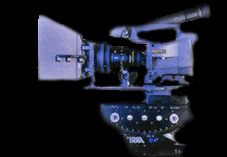It's clear by now that technology is
having an enormous effect on the music business. Between the astounding
progress in affordable recording gear, and the explosion of the Internet
as a distribution channel, a greater variety of music is available to
nearly every listener in the world than ever before.
What's more, the increase in channels offered by cable, satellite TV
and radio, and even cell phones, has only broadened the scope of music
available.
 |
|


The Importance of Live Mixing

Years ago,
the brilliant cartoonist Gary Larsen published a strip showing a
sound man pushing the "suck" button on his board to get back at the
band that pissed him off. Every musician that's every worked with a
sound engineer gets the point: they can make you or break
you.

But even live mixers with the best of intentions don't
always do a good job. A lot of them don't know what they're doing.
In order to be effective, they have to understand room acoustics
(including how materials and people will absorb certain
frequencies), electronics, the principles of mixing, and more. It's
part science, and part art.

How does one
develop this skill? Study with a master -- in the real world.
Because the challenging part of live mixing is that every location
is different. On-the-job training is vital, only a working pro can
teach you how to roll with the punches in every situation. Just ask
the bands that depend on them!



Why Musicians Should Know the Recording
Studio

When a group
goes into the studio, they're putting their art into the hands of
the producers and engineers at the controls. If that band, artist,
or musician is you, then it's important that you understand the
process.

First of all
is the performance itself. Is your guitar reacting like it does in
other locations? Do you have trouble holding pitch when singing
harmonies while wearing headphones? What about the drummer -- what
does he need to keep the tempo solid through every track? (Maybe
it's cowbell hits on the quarter note, maybe a busier hi-hat eigth
note is needed.)

Next is the
way sound that comes out during playback. Translating what's in your
head -- or what you hear at gigs and rehearsals -- onto a hard-drive
is difficult. And nothing is more frustrating than knowing that
something is wrong, but not knowing why.

The point is
that the more you know about how recording works, the better able
you are to ensure that your material will shine as brightly as
possible.

|
|
 |
While some of the established players
in the industry are frightened of the changing landscape (many records
labels are running scared), they're missing the big picture:
There are an incredible number of new opportunities for those willing
to take advantage of them. Especially those involved in the field of
recording. Because let's face it: all that music has to be recorded somehow!
What hasn't changed at all is the value of human knowledge and skill in
this field. In fact, they're more important than ever.
Why? Several reasons.
Equipment itself cannot make a good
recording.
Sure, you can go to a music store, and, for a few hundred dollars,
purchase enough gear to make a quality recording. But you still have to
know how to use it properly.
After all, the physics of sound haven't changed, just because
technology has advanced. Knowledge of the "basics," like microphone
placement, eq paramaters, natural acoustics, etc., are still vital to
creating a great sound.
Technology can't network for you.
Unless you're a 21st century Mozart who can "do it all by yourself,"
you're going to have to work with other people. Musicians, songwriters,
singers, producers, marketing people, advertising agencies -- you get the
picture. "Who you know" is just as important as it always was!
As a friend in the business once said, "Your relationship chops may be
the most important ones in your arsenal."
The most valuble gear you have is sitting on top of your
neck.
That's right, we're talking about your ears -- and your brain. The
ability to hear and discern great sound is essential in creating great
music. But don't get fooled into thinking that you either "have it or you
don't." There's no greater fallacy in the music industry. 99% of what
appears to be "talent" is simply the result of hard work and
dedication.
Now more than ever, people with the
experience and skills will be the ones creating memorable sounds. Not to
mention the ones who will be well compensated for their efforts!
It's also important to realize that technology has not diminished the joy of making music. In fact, it has enhanced it! There is so much
more that is possible now, that creativity is bounded only by your
imagination and ability.
So if you love music, and have always wanted to be involved in it's
creation, you're lucky! This is an exciting time to be entering the
business. Work hard, keep learning, and open yourself up to a world of
possibilities
ZDT AUDIO CURRICULUM ~
RECORDING SUCCESS STORIES



